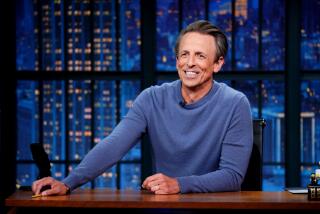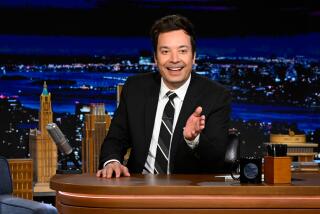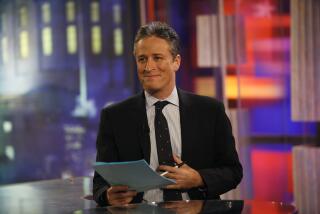Critic’s Pick: TV Picks: ‘Late Show,’ ‘My Brother’s Bomber,’ ‘Adam Ruins Everything’
“Late Show with Stephen Colbert” (CBS, late-night weeknights). The Colbert “Late Show” administration has caught a lot of flak, some of it contradictory, since it was sworn in some three weeks ago. (I described its admittedly imperfect premiere as “strong,” and, as talk-show first nights go, it was; you can rehearse a thing as much as you like, but until it’s on its feet in the world you don’t really know what you have, what screws to tighten and which to make looser.) Some of the objections came from those who couldn’t separate the thundering ironic shell from the quieter person inside, who found Colbert cooked funnier than Colbert raw; but it’s a matter of missing the caterpillar after the butterfly’s emerged -- they’re the same creature, identical but different. It reminds me a little of the betrayal some Obama supporters felt when he didn’t turn out to be the avenging angel they thought they’d elected, either misreading the candidate, who was clearly never that, or forgetting what actually happens in politics.
SIGN UP for the free Essential Arts & Culture newsletter >>
Merely by taking the job, Colbert has to navigate a lot of changes. An 11:30 p.m. network talk show has different needs -- some more weighty, some more frothy, some merely structural -- than does a basic cable show, or even a 12:30 a.m. network show. He has to establish his new, authentic self while giving the fans enough of what they used to like him for, without seeming to actually be the self-admiring pundit he used to portray; viewers have to learn a new language, learn to locate the new irony, which is somewhat differently seated than the old irony. (See his Donald Trump interview, which some viewers found weak or fawning, but which, to my eye, managed to treat him as a human punchline without offending him outright; and very much in line with all the Trump jokes he’s made.) As if to address these concerns, Colbert himself refers, perhaps more often than he needs or ought to, to the fact that he used to play a character on another show.
Trump aside, some have found him wanting as an interviewer, and I would say that it’s true that he hasn’t yet mastered the art of seeming invested in the celebrity promotional wheel to which he has willingly, if helplessly been strapped; you can see him sometimes looking for a way in that feels, let’s say, comedically dignified, just as he’s been looking for a way to pitch products without seeming a total shill. And you never know what you’re going to get back from the person you’re interviewing; there is a learning curve involved that even years of in-character interrogations cannot prepare you for. Trump, for his part in that interview, was uncharacteristically subdued, where other recent guests like Bernie Sanders and Elizabeth Warren took up their talking points and ran.
As for viewers who miss “The Colbert Report,” a huge chunk of it is for all intents and purposes set down within his new show’s first half-hour, and it’s reliably funny. What the host doesn’t communicate yet is a sense of the show as a community, rather than as a platform. There is a lot of “I” in his speech and not so much “we,” and it can make him seem big-headed in fact rather than just in comedy. But there seems to be an attempt to address this. And already there is nothing on network late-night quite like it: Last Thursday, with the pope in New York, he hosted a panel of well-known fellow Catholics -- journalists Andrew Sullivan and Maria Shriver and comedian Jim Gaffigan -- followed by Archbishop Thomas Wenski of Miami, and the exchanges, about what it means to be a modern American Catholic were thoughtful and witty and sometimes silly and, in a way, daring. A work in progress, sure, but one already worth watching.
“Frontline: My Brother’s Bomber” (PBS, Wednesdays). In which documentary filmmaker Ken Dornstein gets it into his head to find the men, all the men, responsible for the bombing of Pan Am Flight 103, which broke up over Lockerbie, Scotland, on Dec. 21, 1988, killing 270, one of whom was Dornstein’s brother, David. Outraged by the “compassionate release” and return to Libya in 2009 of the plot’s only convicted conspirator -- “like watching a guy get away with murder in real time” -- and seeing an opportunity in the space opened up by the 2011 Libyan revolution, Dornstein traveled to the Middle East, while Moammar Kadafi was still on the run, to find answers more satisfying than any the official investigations had turned up, or made public. (It’s an incidental reminder that Libya suffered chronically at Kadafi’s hands.) The resulting film is being presented in three parts, a serial investigation in the manner of NPR’s “Serial,” or HBO’s “The Jinx,” and like those series it is both about the search and the searcher, what can be known and never known, what needs to be known and what can be left alone. Only the first of its three hours has been available for review, but I’ve also read the just-published New Yorker article about Dornstein and his film (“The Avenger,” Patrick Radden Keefe, Sept. 28) and have some foreknowledge of what he’ll learn and what he hasn’t shared so far. Some of these choices will be artistic -- all documentaries are selective, given a need not just to document, within a set time, but also to enthrall -- and some of them will proceed directly from the need to keep people watching through two subsequent episodes, and to reward them for doing so (i.e., cliffhangers, teasers, reveals.) Meanwhile, it does pull you in, even as it seems to acknowledge that human beings are mysteries you can never solve.
“Trailblazing Women: Behind the Movies Ahead of Their Time” (TCM, Tuesdays and Thursdays throughout October). Turner Classic Movies, that revival house of the air, this month presents 54 films by or about female directors, from the silent film era -- including six works by turn-of-the-century French filmmaker Alice Guy-Blaché, said to be the first woman to write and direct a narrative film -- to long about now. On tap are movies by Frances Marion, Dorothy Arzner, Elaine May, Martha Coolidge, Joan Micklin Silver, Amy Heckerling, Susan Seidelman, Penny Marshall, Sarah Polley, Kathryn Bigelow, Nora Ephron, Ava DuVernay and others, including Barbara Loden, the first woman (it says here) to write, direct and star in her own feature film, the 1970 “Wanda.” Some are famous, but all are names you would know better in a better world. Your host is TCM regular Illeana Douglas (a director as well as an actress, and the author of a charming, soon-to-be-published memoir -- a forthcoming forthcoming memoir -- “I Blame Dennis Hopper”); her co-hosts include Allison Anders, who directed her in “Grace of My Heart” (not programmed, sadly); Julie Dash (“Daughters of the Dust,” Oct. 22); and Cari Beauchamp, author of “Without Lying Down: Frances Marion and the Power of Women in Hollywood,” the basis of a documentary of the same name (Oct. 1).
“Adam Ruins Everything” (truTV, Tuesdays). The CollegeHumor Web series jumps intact to television, but with higher production values, built-out characters, a bigger cast and a longer running time. Like “Drunk History,” another Internet import, it fills the half-hour by presenting what online would be three separate episodes -- and there were only ever four online episodes as far as I can tell -- and tying them together thematically; this series adds a kind of narrative throughline, in which host Adam Conover appears unbidden, like an annoying guardian angel, to “reveal the awful truth about a beloved part of your world” to a horrified Emily Axford and generally to harsh her mellow. The first episode concerns giving, and how you are doing it wrong, with segments on diamond engagement rings (a “tradition” invented by De Beers to move more diamonds), a remake of the first Web episode; Tom’s Shoes’ sell one/give one policy (clothes donations destroy Third World local business, also there is no Tom); and canned food drives (much of it thrown away, doesn’t meet basic nutritional standards, better to give money). Informational sources (sometimes old enough to give pause) are shown onscreen. Experts are produced, like Marshall McLuhan in “Annie Hall.” Conover, who with Emily Heller (“The Future with Emily Heller”) also hosts Fresh Out! LA, a standup showcase at the UCB Sunset theater, has a kind of Puckish charm; Axford is a winsome, plucky foil (which is to say, she doesn’t finish the episode in a state of existential despair). The show is funny and fast and informative, though (in its own spirit) you shouldn’t necessarily take its myth busting as final, but rather as a spur to continue researching on your own. Adam would approve.
Robert Lloyd resides on Twitter @LATimesTVLloyd
More to Read
The complete guide to home viewing
Get Screen Gab for everything about the TV shows and streaming movies everyone’s talking about.
You may occasionally receive promotional content from the Los Angeles Times.







